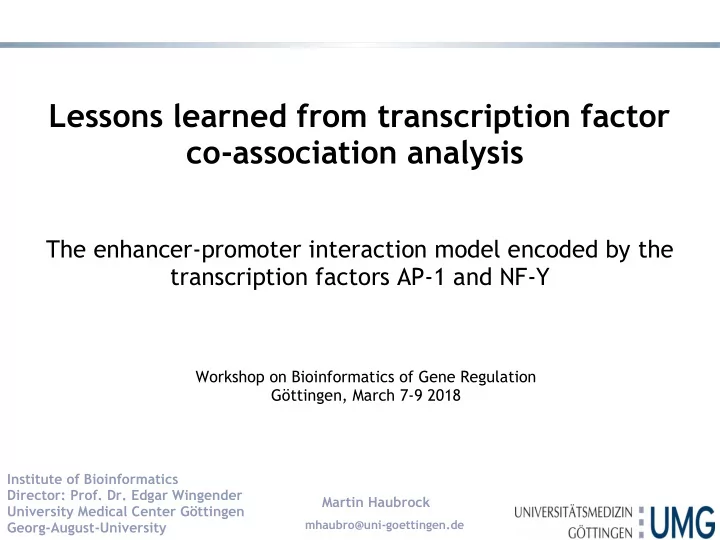

Lessons learned from transcription factor co-association analysis The enhancer-promoter interaction model encoded by the transcription factors AP-1 and NF-Y Workshop on Bioinformatics of Gene Regulation Göttingen, March 7-9 2018 Institute of Bioinformatics Director: Prof. Dr. Edgar Wingender Martin Haubrock University Medical Center Göttingen mhaubro@uni-goettingen.de Georg-August-University
Binding mode: TF-DNA interactions Binding mode: TF-DNA interactions Direct and indirect factor binding Direct and indirect factor binding Direct Transcription factors (TF) (direct motif ) are proteins that control the efficiency of gene expression Tethering Most of them act by recognizing cis-regulatory ( indirect motif ) elements (TFBS) in gene proximal (promoter) or distal (enhancer) regions Co-binding ( two motifs ) Dimerization ( one motif )
Interpreting ChIP-seq: Motif finding Interpreting ChIP-seq: Motif finding Regulatory and transcriptional Regulatory and transcriptional complexity resulting from complexity resulting from ChIP-seq experiments: ChIP-seq experiments: ChIP-seq of a transcription ChIP-seq of a transcription factor results in factor results in ChIP-seq immunoprecipitation of bound immunoprecipitation of bound DNA sequences and and DNA DNA DNA sequences Motif enrichment sequences in close proximity sequences in close proximity (Mecer and Mattick 2013) (Mecer and Mattick 2013) unspecific??? Hypothesis : Close spatial proximity of distal and proximal ChIP- seq regions exhibit functional enhancer/promoter relations.
Enhanceosome Enhanceosome Direct TF-DNA interaction Direct TF-DNA interaction RNA Polymerase Enhancer Transcription factors and Co-factors Promoter Gene A RNA Polymerase TF of interest TFBS
Enhanceosome Enhanceosome Direct TF-DNA interaction Direct TF-DNA interaction RNA Polymerase Enhancer Transcription factors and Co-factors Promoter Gene A RNA Polymerase TF of interest TFBS
Enhanceosome Enhanceosome Indirect TF-DNA interaction Indirect TF-DNA interaction RNA Polymerase Enhancer Transcription factors and Co-factors Promoter Gene A RNA Polymerase TF of interest TFBS
Study Study Enhancer Promoter Analysis Enhancer Promoter Analysis Motif enrichment in ChIP-seq data interacting regions using Motif enrichment in ChIP-seq data interacting regions using Receiver Operating Characterisitic (AUROC) using PWM library Receiver Operating Characterisitic (AUROC) using PWM library from TRANSFAC from TRANSFAC ChIP-seq data from ENCODE ChIP-seq data from ENCODE HUVEC, K562, HeLa S3, and GM12878 HUVEC, K562, HeLa S3, and GM12878
Binding site composition for c-Fos ChIP-seq Binding site composition for c-Fos ChIP-seq HeLa, K562, and GM12878 promoter exhibit NF-Y binding HeLa, K562, and GM12878 promoter exhibit NF-Y binding motifs motifs
Overlap of c-Fos and NF-YB ChIP-seq intervals Overlap of c-Fos and NF-YB ChIP-seq intervals c-Fos precipitated regions largely co-localize with NF-YB c-Fos precipitated regions largely co-localize with NF-YB genomic intervals genomic intervals
Mutual exclusivity of AP-1 and NF-Y motifs Mutual exclusivity of AP-1 and NF-Y motifs NF-Y and AP-1 motifs are mutually exclusive in c-Fos NF-Y and AP-1 motifs are mutually exclusive in c-Fos precipitated regions (both in distal and in proximal precipitated regions (both in distal and in proximal intervals) intervals) Anticorrelation: R = -0.9971 (A) distal, (B) proximal
CCAAT motif dimers in proximal regions CCAAT motif dimers in proximal regions Many c-Fos-bound genomic intervals exhibit CCAAT dimers Many c-Fos-bound genomic intervals exhibit CCAAT dimers in a specific configuration in a specific configuration Δ=31
Enhancer/Promoter distance distribution Enhancer/Promoter distance distribution AP-1 positive enhancers tend to be close to c-Fos targeted AP-1 positive enhancers tend to be close to c-Fos targeted promoters promoters Promoter set Enhancer set Promoter set Enhancer set P(c-Fos+NF-YB):1724 c-Fos: 3571 NF-YB: 3186 c-Fos-bound and AP-1 motif shaped enhancers show a clear tendency to be closer to c-Fos-bound and CCAAT box characterized promoters than the control (Mann-Whitney Test: P = 3.31703e − 281)
CCAAT direct repeats regulate defined gene set CCAAT direct repeats regulate defined gene set NF-Y binding site architecture defines a c-Fos targeted NF-Y binding site architecture defines a c-Fos targeted promoter class promoter class Model: c-Fos/AP-1 and NF- YB/NF-Y interaction For more details:
Recommend
More recommend